Suppose you are a customer engaged in a crucial business call or enjoying an important video conference; suddenly, the audio quality of business calls drops, and the video becomes blurred. Frustrating, isn’t it? This is because of poor VoIP QoS.
Poor QoS often results in distorted audio, delays in transmission, and jitter– making it challenging to convey information accurately and causing frustration for all parties involved.
In this blog, we will understand its importance, benefits, and VoIP QoS best practices. Let’s get started without ado!
Improve the quality of your VoIP service by providing sufficient bandwidth and configuring Quality of Service (QoS) settings to reduce latency, resulting in smoother communication.
Consistently assess your network's performance and security to find the optimal balance between seamless communication and robust protection for your VoIP infrastructure.
Educate users on VoIP QoS best practices to enhance the benefits of Quality of Service. Empowering users with knowledge will contribute to maintaining efficient communication and minimizing potential disruptions in VoIP service quality.
What Is VoIP QoS (Quality of Service)?
VoIP QoS, or Quality of Service, is an element that makes sure your internet phone calls and video chats work really well. It uses smart tricks and technologies to make sure your voice and video messages travel smoothly over the internet. Without it, you might face issues like delays, weird sounds, or parts of your messages getting lost.

In simple words, this technology keeps your conversations clear and hassle-free. Whether you are on a work call or having a video chat with friends, VoIP QoS is there to make sure everything runs super smoothly. In a nutshell, it gives you the best talking and chatting experience possible!
Why Does Quality of Service (QoS) Matter?
QoS has significant importance when it comes to VoIP communication. The following are the five key factors that establish the importance of QoS.
1. Crystal-Clear Communication
One of the major reasons why VoIP QoS is crucial in digital communication is its role in ensuring top-notch quality for your voice and video calls. Without QoS, issues such as echoes, delays, and audio glitches can disrupt conversations, making effective communication difficult.
QoS for VoIP involves smartly prioritizing data packets and reducing latency to ensure that your online conversations flow smoothly. This will eventually allow you to express yourself clearly and without interruptions.
You May Also Read : Types of Business Communication: Which Ones to Use and When
2. No Jitter and Latency
When it comes to the VoIP call quality, maintaining a high standard of service is crucial. Two key challenges often encountered are “jitter” and “latency,” which can adversely affect the quality of VoIP calls.
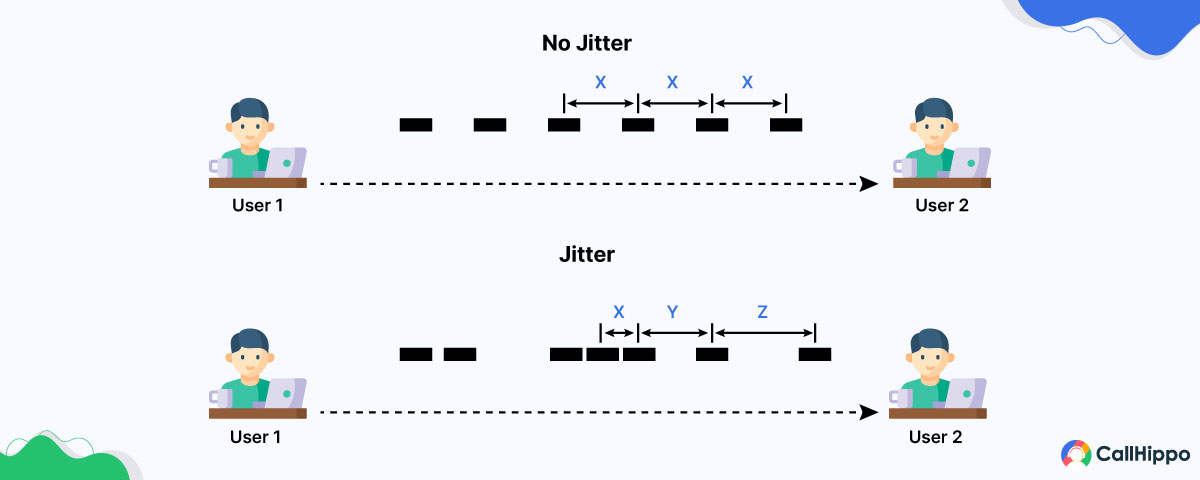
Jitter involves fluctuations in the arrival time of data packets, causing disruptions in audio playback. To counter this, Quality of Service (QoS) steps in– easing out these variations to guarantee a steady data flow.
Furthermore, QoS plays a vital role in minimizing latency, the time delay between sending and receiving data on network devices. By doing so, it prevents awkward pauses and ensures seamless real-time communication experiences.
3. Reliable Video Conferencing
Video conferencing has become a vital component of communication in today’s age of remote work and widespread global collaboration. Quality of Service (QoS) is key to ensuring a dependable and top-notch video conferencing experience. It efficiently manages bandwidth utilization, gives priority to video data, and minimizes packet loss.
This guarantees that your virtual meetings run seamlessly, offering clear visuals and synchronized audio. Such reliability is vital for smooth communication, whether in professional or personal contexts.
4. Enhanced User Experience
VoIP QoS or VoIP Quality of Service plays a crucial role in improving the user experience by reducing disruptions and frustrations during online communication.
Let’s understand this with an example. You are on a business call that keeps cutting out, or your video conference freezes repeatedly. These disruptions aren’t just annoying; they can seriously hamper productivity. That’s where Quality of Service (QoS) steps in.
By managing internet traffic effectively, QoS ensures your calls and video chats run seamlessly, whether you are discussing work matters or catching up with loved ones.
5. Prioritization of Critical Applications
In a shared network with multiple applications and devices, ensuring Quality of Service (QoS) is vital for prioritizing critical functions. QoS for VoIP (Voice over Internet Protocol) ensures that voice and video data receive priority over less time-sensitive activities like file downloads or background tasks.
This prioritized treatment ensures that essential communication services operate seamlessly, even when the network experiences congestion. Essentially, QoS acts as a network traffic manager, efficiently allocating resources to where they are most needed– thereby optimizing the overall performance of the network.
Limitations of VoIP QoS
Although VoIP Quality of Service (QoS) enhances communication, it faces several limitations. Let’s take out some of the major limitations of VoIP Quality of Service in detail.
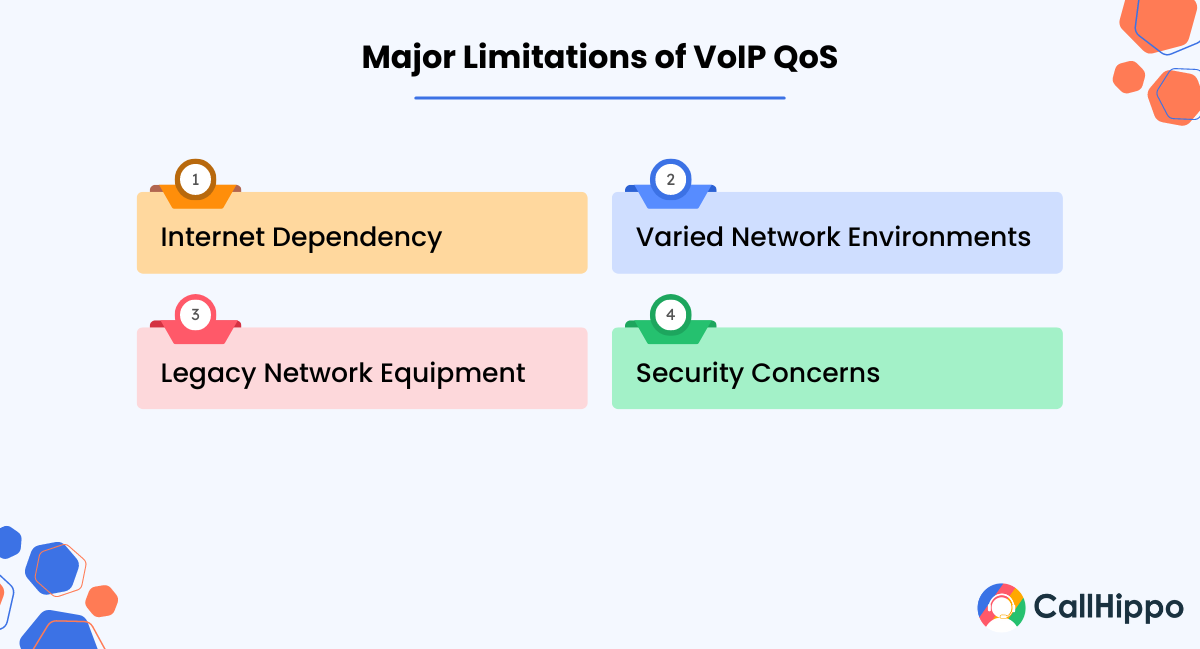
1. Internet Dependency
Ensuring good quality for voice calls over the internet, known as VoIP QoS, depends heavily on the strength of your internet connection or internet connection speed.
Your experience with VoIP can be affected by factors like your internet speed, how much data your internet provider allows you to use, how crowded the network is, and if there are any times when the internet is down.
Even with measures in place to manage QoS, difficulties with the internet itself can still lead to problems during VoIP calls– causing issues with how clear and reliable the calls are.
2. Varied Network Environments
Optimizing the QoS for VoIP can be challenging in various network setups. While organizations may have control over their Local Area Network (LAN), the broader internet, known as the Wide Area Network (WAN), is often beyond their control.
In situations where the WAN introduces unpredictable elements, maintaining a reliable QoS becomes intricate. This will potentially cause disruptions in voice and video communication.
3. Legacy Network Equipment
When adding VoIP systems to current networks, there might be problems making them work well with older equipment. If routers, switches, or hardware don’t support QoS (Quality of Service), it can make it hard to ensure good quality for voice calls.
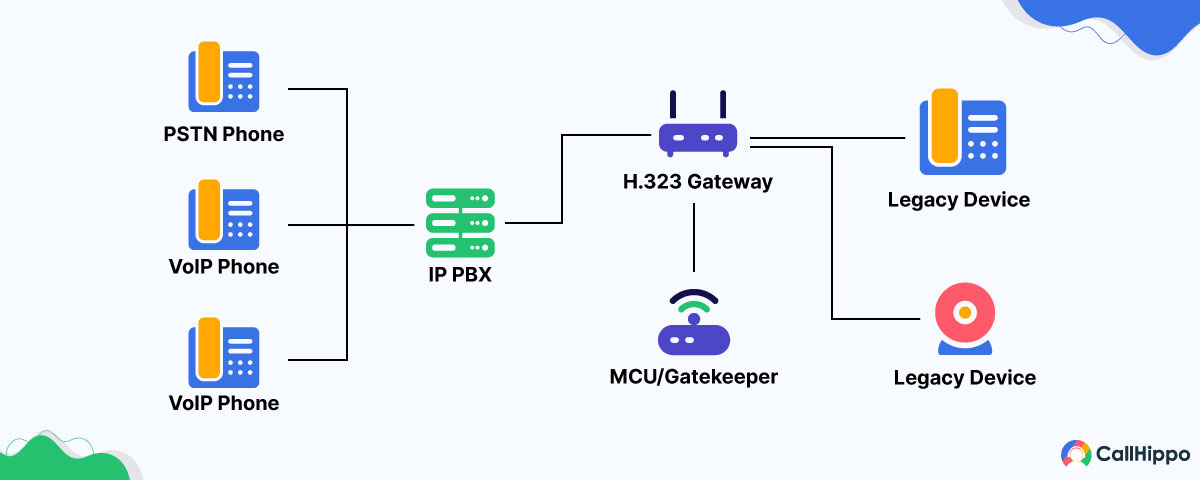
Upgrading the whole network to support VoIP properly can be expensive. For this reason, some organizations end up with less-than-ideal QoS, which can make communication less reliable overall.
4. Security Concerns
Ensuring quality service for voice communication over the internet, known as VoIP QoS, often requires prioritizing certain types of data. However, this approach can expose systems to security risks. Cyberattacks, like Distributed Denial of Service (DDoS) attacks, targeted at VoIP networks can overwhelm them– leading to disruptions in QoS.
You May Also Read : Secure Your Voip Data With These Best Practices
Striking the right balance between achieving optimal QoS and implementing strong security measures poses an ongoing challenge. Organizations must carefully navigate this trade-off between performance and protection smartly.
Understanding VoIP QoS Benchmarks
Enhancing the quality of service (QoS) for Voice over Internet Protocol (VoIP) requires a thorough understanding of essential network benchmarks. Let’s explore the crucial metrics that contribute to a successful QoS strategy.
1. Latency
Latency is the measure of the time it takes for data packets to reach their destination IP address.
- In the context of VoIP systems, any delays that go beyond 150 milliseconds in each direction can have negative effects on the transmission of voice data packets, causing interruptions in communication.
- It is crucial to maintain a high level of QoS (Quality of Service) for VoIP to ensure seamless and reliable voice communication.
2. Network Jitter
Network jitter assesses the fluctuation in delays of data packets, a critical aspect for ensuring smooth real-time voice communication in VoIP systems.
- Unstable network connections may result in packets arriving in a disordered sequence, leading to the distortion of VoIP calls and making them incomprehensible.
- Maintaining a network jitter below 30 milliseconds is crucial for preserving the quality of voice calls, underscoring the importance of ensuring stable and consistent packet delivery.
3. Packet Loss
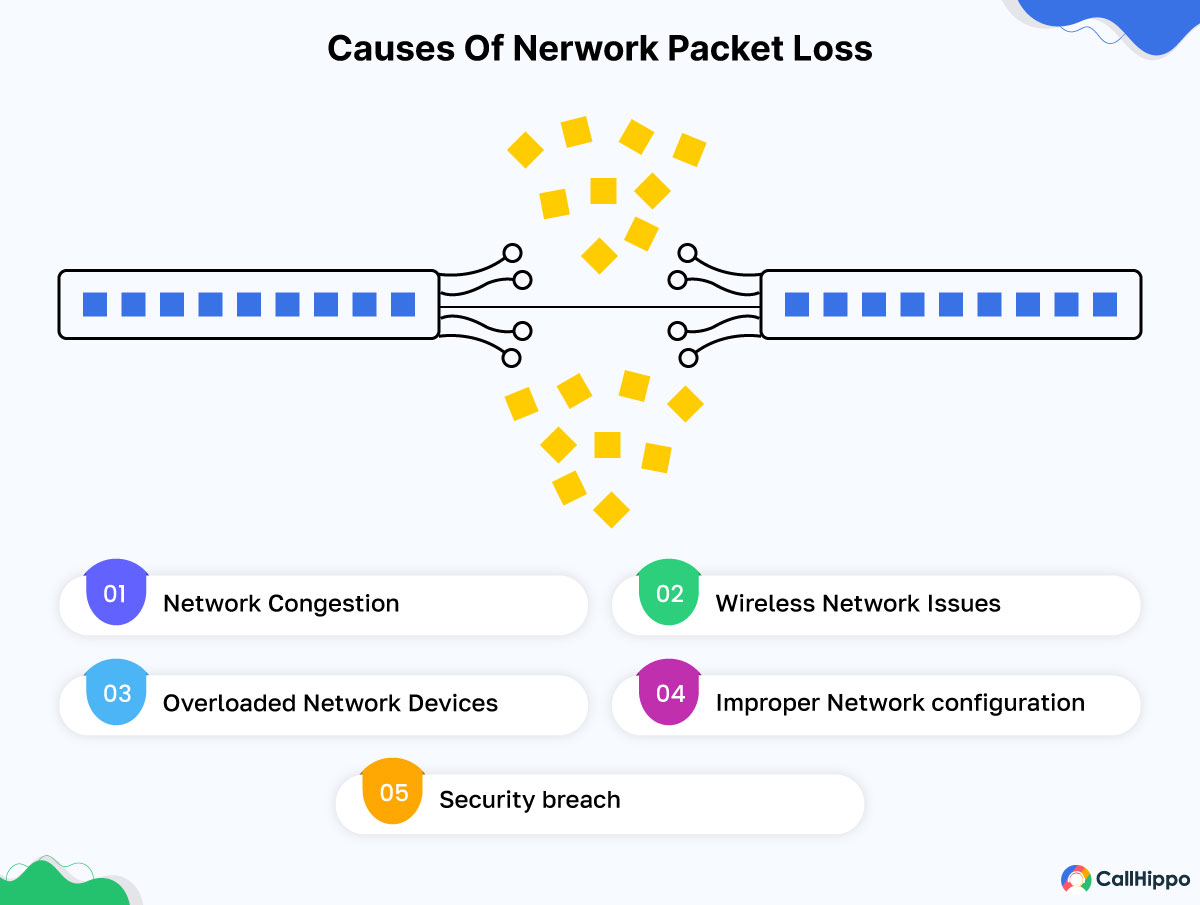
Packet loss measures how many data packets are lost during transmission, which is really important for making sure VoIP calls sound good.
- Because voice data is delicate, losing more than 3% of packets can make VoIP calls sound noticeably worse.
- It’s really important to reduce packet loss as much as possible to keep communication clear and smooth.
4. LAN and WAN Network Topologies
LAN (Local Area Network) is the network managed by your router.
- WAN, which stands for Wide Area Network, refers to the extensive internet network, presenting distinctive challenges for optimizing VoIP QoS (Quality of Service).
- It is essential to grasp these network structures because VoIP packets travel through both LAN (Local Area Network) and WAN to reach their intended destination.
- The optimization techniques employed differ based on whether control can be exercised over the LAN or if challenges arise in the expansive WAN.
By examining these key factors and customizing your strategy to tackle issues like delays, fluctuations in network signals, data packet loss, and network structures, you can create a strong QoS framework for your VoIP system. This will guarantee the best possible performance and a smooth communication experience.
VoIP QoS Best Practices
To ensure clear and reliable VoIP communication, it is essential to adhere to VoIP QoS best practices. This involves prioritizing voice traffic, efficiently handling bandwidth, reducing latency, and optimizing network equipment.
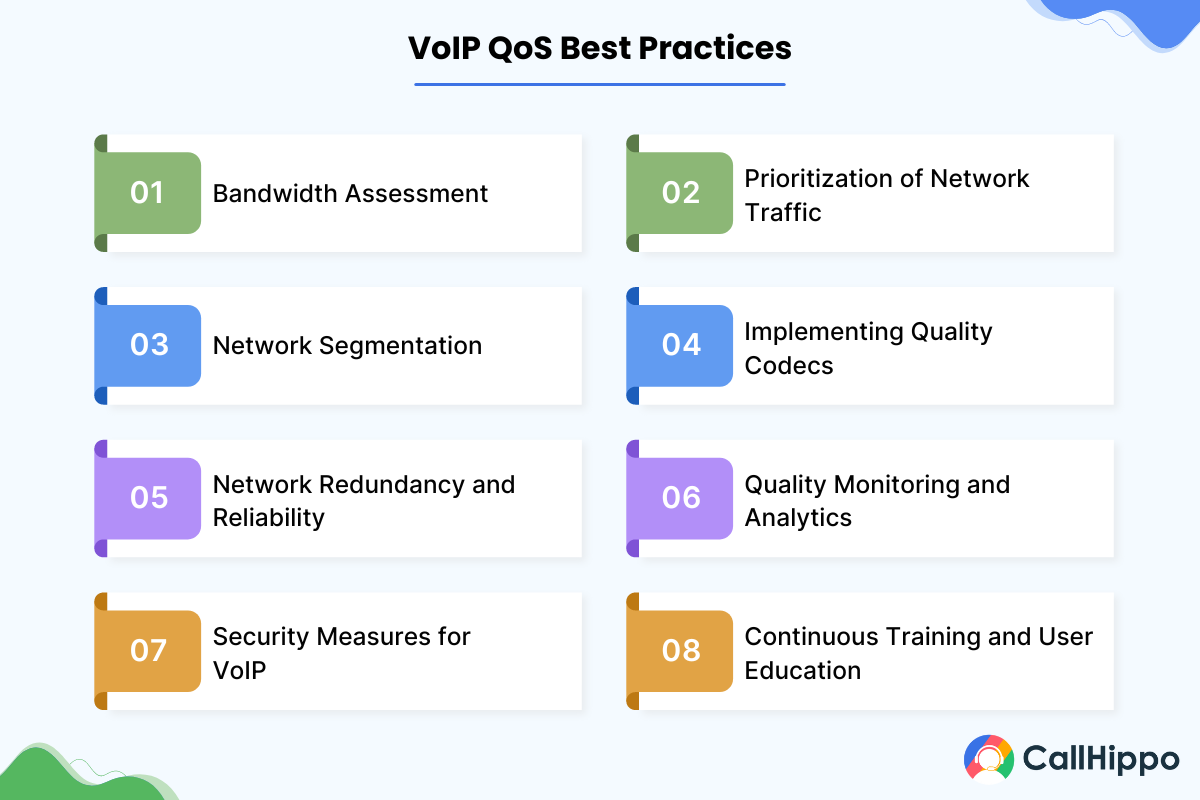
Let’s check out the key QoS practices for VoIP that contribute to improved voice quality and reliability.
1. Bandwidth Assessment
Start by thoroughly examining your network’s bandwidth capabilities. Understand the bandwidth needs of your VoIP system to ensure it matches the network’s capacity.
This assessment helps prevent network congestion and ensures ample bandwidth for handling voice and video data. Eventually, it helps avoid problems such as dropped calls or diminished call quality– ensuring a smoother communication experience.
2. Prioritization of Network Traffic
Enhance the VoIP QoS by prioritizing VoIP traffic over less time-sensitive data. By setting up routers and switches to identify and give priority to VoIP packets, you can ensure that both voice traffic and video data receive preferential treatment.
This approach prevents delays caused by competing traffic, ensuring a seamless and uninterrupted communication experience for users depending on VoIP services.
3. Network Segmentation
Organize your network into sections or virtual LANs (VLANs) to separate and give priority to VoIP traffic. This division safeguards the performance of your VoIP system by preventing other data-heavy applications from impacting it.
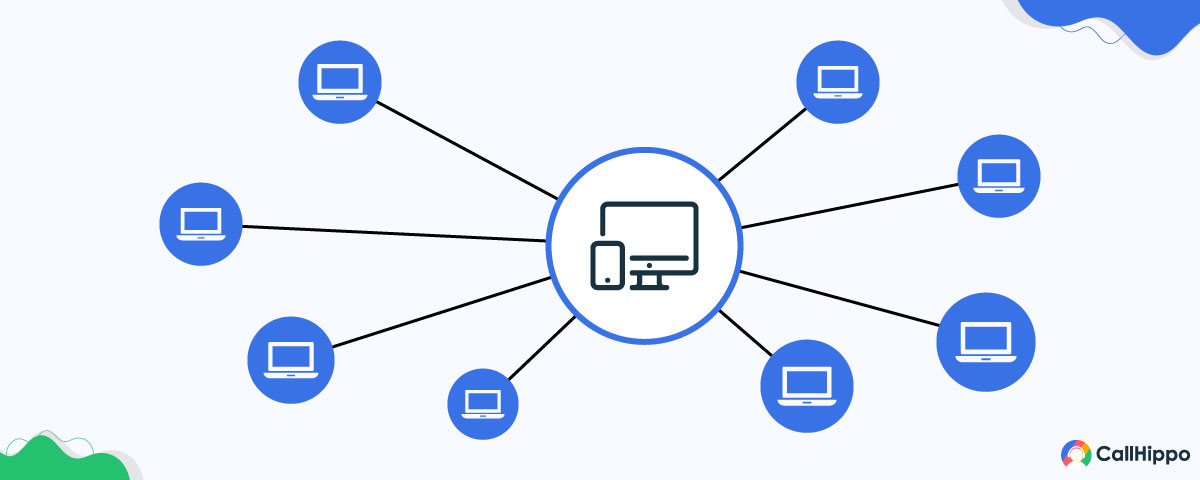
By establishing dedicated pathways for voice and video data, you improve the overall efficiency of your network and lower the possibility of congestion.
4. Implementing Quality Codecs
Choosing effective and top-notch codecs plays a vital role in maximizing bandwidth usage and ensuring optimal call quality in VoIP systems. Codecs are responsible for encoding and compressing voice data for transmission, influencing both audio fidelity and bandwidth consumption.
It’s essential to select codecs that find the right balance between bandwidth efficiency and audio clarity. This ensures that your VoIP system operates smoothly, maintaining the quality of voice and video calls without compromising efficiency.
5. Network Redundancy and Reliability
Improve your VoIP system’s reliability by adding network redundancy. This means setting up backup systems and routes to maintain communication if the main network fails.
Redundancy helps prevent interruptions in service, ensuring that users can still make and receive calls even during network outages. This boosts the overall strength and trustworthiness of your VoIP setup in addition to VoIP QoS.
6. Quality Monitoring and Analytics
Consistently check how well your VoIP system is working by using the best network monitoring tools and analytics. These tools can keep an eye on important performance measures like jitter, latency, and packet loss.
By finding and fixing possible problems in advance, you can keep your call quality top-notch, quickly solve any issues, and make sure that users who depend on VoIP communication always get excellent service.
7. Security Measures for VoIP
Establish strong security measures to safeguard your VoIP system against potential threats. VoIP systems are vulnerable to cyberattacks, such as eavesdropping and denial-of-service attacks.

In addition utilize encryption protocols, ensure secure user authentication, and conduct regular security audits to protect against unauthorized access and data breaches.
Remember, securing your VoIP infrastructure is crucial for preserving the confidentiality and integrity of voice and video communications.
8. Continuous Training and User Education
Implement continuous training initiatives to educate users on effective practices for VoIP communication. Users should comprehend the influence of bandwidth-intensive activities on call quality and be proficient in utilizing VoIP features.
Knowledgeable users play a pivotal role in the success of your business VoIP system, ensuring responsible resource usage and prompt reporting of issues. This collaborative approach contributes to sustaining optimal communication quality.
Fix QoS With CallHippo VoIP Solution
By now, you must have understood that QoS in a VoIP network plays a crucial role in improving the overall support process and user experience. This means you must choose a VoIP service provider with a robust infrastructure and an excellent network.
One such leading VoIP provider that ticks all these boxes is CallHippo.
CallHippo is not only a full-featured, all-in-one VoIP solution but also comes with a range of other benefits, such as an excellent uptime guarantee, a global network, and more.
Explore the Full Suite of Callhippo Features to Gauge the System’s True Potential.
Here are the key factors that give CallHippo a competitive edge, making it the top choice for a VoIP solution with optimum QoS.
- CC2 Phone System
- 99.9% Uptime Guarantee
- 7+Telephony Network
- 5+Global Server
- Guaranteed CLI In 70+Countries
All the components, characteristics, and advantages contribute to making CallHippo an excellent VoIP solution that can effectively address quality of service (QoS) issues for voice communication.
FAQs
How can I measure VoIP QoS?
You can measure VoIP QoS with QoS monitoring tools like ManageEngine OpManager MSP, Site24x7, SolarWinds, Auvik, and Datadog. Using these tools, you can measure metrics like latency, jitter, and packet loss. Tools such as MOS scores, jitter buffers, and packet loss rates assess the overall quality of voice communication.
Is there a standard for VoIP QoS?
Yes, there is a standard for VoIP QoS called Mean Opinion Score (MOS), which provides a standardized measure of voice quality.

Subscribe to our newsletter & never miss our latest news and promotions.









